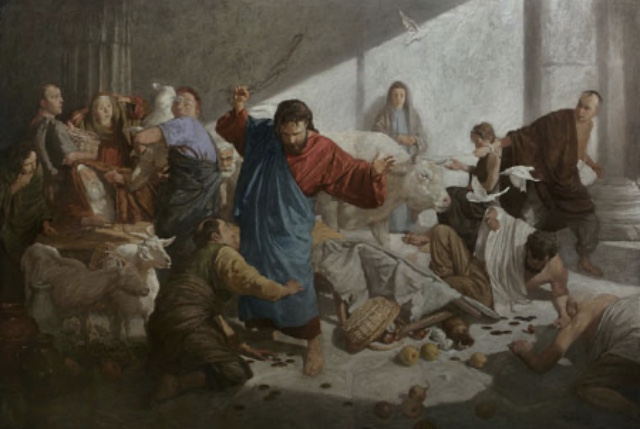Author’s note: If you are new to my blog and are interested in reading the 23.xx series, please first read the 23.01 through 23.09. Consider how I arrived where I am, through much misunderstanding of biblical Christianity and maybe we’ve crossed spiritual paths. I am impassioned by Jesus Christ’s teaching of the “narrow gate” (Matthew 7:13-14) and, in love, my posts are focused on driving your attention to that critical truth.
Recently, Sound of Freedom has been receiving quite a widespread reaction – I’ll seek to find an associated biblical topic and how does it relates to the narrow way.

***
Why was Jesus enraged enough to disrupt the people buying and selling things in the Temple? (Matthew 21:12-13, Mark 11:15-17, Luke 19:45-46, John 2:14-16)
It is important to make these connections between the Old Testament and the New Testament to see how it is all Scripture is authored by God and how the theme is consistent.
This was not the first time God was angered by the practices of those leading His chosen people and of the profaning of holy ground. Two important passages (among many) from the Old Testament, Isaiah 56:1-8 and Jeremiah 7:1-11 powerfully offer an overview of God’s intention of creating a place where all people, from all the world, are invited in faith to offer their prayer offering to the Lord. Offerings are made in good will, from a heart of repentance and faith in the one True God.
The Temple (originally the Tabernacle) was a holy place built for the actual presence of God in the midst of His people. The many ceremonial practices given in the time of Moses were established to emphasize, with painstaking detail, the division between unclean sinful man and sinless, holy and righteous God and to make God’s people and the character of God stand out among the pagan nations. The consequences for breaking these ceremonial laws were deadly, sometimes immediate and sometimes delayed. In Jesus’ time, God stored up His wrath because of the prolonged contempt by His chosen people.
The Temple was never intended to be a place for man to give free reign to his sinful nature in the form of enriching themselves, like the Pharisees and the religious leaders who were abusing the peoples’ worship of God in the common peoples’ effort to obey the Law. In their self-righteousness mastery of outward appearances, fastidious in their ways, the religious rulers excluded and condescended themselves to many whom God sought to gather together. As Jesus taught, “ I came not to call the righteous, but sinners to repentance” (Luke 5:32).
Some excerpts from Isaiah 56:1-2: “Keep justice, and do righteousness, for My salvation is about to come, and My righteousness to be revealed. Blessed is the man who does this and the son of man who lays hold on it, who keeps the Sabbath, and keeps his hand from doing evil…”
In verses 56:3-5, God expresses through Isaiah how even, foreigners, disenfranchised people, all those who feel separated can find peace and acceptance from God as long as they “hold fast to His covenant” (v4).
“… [those who] join themselves to the Lord, to serve Him, and to love the name of the Lord, to be His servants – Everyone who keeps from defiling the Sabbath, And hold fast to my covenant- Even them I will bring to My holy mountain… For my house will be called a house of prayer for all nations” (Isaiah 56:6-8).
From Jeremiah Chapter 7, we get more depth of understanding of how God sees man defiling his holy places, “Behold, you trust in lying words that cannot profit. Will you steal, murder, commit adultery, swear falsely, burn incense to Baal, and walk after other gods whom you do not know, and then come and stand before Me in this house which is called by May name, and say, ‘We are delivered to do all these abominations’? Has this house, which is called by My name, become a den of thieves in your eyes? Behold, I, even I, have seen it,” says the Lord” (Jeremiah 7:8-11).
When Christ swept through the Temple overturning the tables of the money changers and driving out those who were fleecing the common people in their effort to sacrifice and worship God, He did so with both Godly indignation and with enormous restraint. He was quite cognizant, and had conveyed to His disciples many times that His mission on earth was ultimately one of a Suffering Servant and Redeemer, leading to His death and resurrection (i.e. Matthew 16:21).

***
Jesus Cleanses the Temple
“…He found in the temple those who sold oxen and sheep and doves, and the money changers doing business. When He had made a whip of cords, He drove them all out of the temple, with the sheep and the oxen, and poured out the changers’ money and overturned the tables. And He said to those who sold doves, “Take these things away! Do not make My Father’s house a house of merchandise!” (John 2:14-16) (see Matthew passage for the translation of “…den of thieves”.
And the scribes and chief priests heard it and sought how they might destroy Him, because all the people were astonished at His teaching…” (Mark 11:18).
If effect, this elitist sect of Judaism had made a profitable business by conveniently locating the goods needed for sacrifice and allowing merchants, and money exchangers to profit from the people and authorizing commerce in the House of God, breaking the covenant with God on many levels.
This is one of those “Is nothing sacred?” moments.
Not only did Jesus’ cleansing of the Temple form a timeless teaching for us to strive for in effort to be holy like our Lord is holy, but this act of this disrupting of revenue generating establishment was part of a crescendo of condemnation of the rulers of Israel. As a result, the rulers, by and large, grew extremely hateful rather than humbly penitent.
In general, the religious rulers were blind to how Jesus Christ spelled God’s end of the centuries of sacrifices required by the Law, ceremonial laws that pointed to the eventual coming of the Messiah. All that their hypocritical and idolatrous world was based on was coming to an end, they had missed the meaning of God’s revelations and their spiritual intent. Many prophetic visions in Scripture pointed to Jesus fulfilling the purposes of the ceremonial law and the symbolic sacrifices provided by God’s instructions given through Moses.
It is truly Good News for all who will embrace the assurance of eternal salvation and God’s forgiveness through:
- Repentance of sin in sincere remorse and regret for transgressing God’s moral Law.
- Acceptance by Faith in the substitutionary suffering and death of the Son of God on the Cross.
- To be followed by joyful living under the Lordship of the Risen Jesus Christ.
***
Jesus lamented over Jerusalem, prophesying to his disciples the future destruction of Jerusalem and its temple which would occur in 70 A.D. by the Romans.
“O Jerusalem, Jerusalem, who kills the prophets and stones those who are sent to her! How often I wanted to gather your children together, the way a hen gathers her chicks under her wings, and you were unwilling. Behold, your house is being left to you desolate! For I say to you, from now on you shall not see Me until you say, ‘Blessed is He who comes in the name of the Lord!” (Matthew 23:37-39).
Although Jesus’ forceful cleansing of the temple sent a strong message and its effect were but a small prelude to the judgment of God. His wrath and fury and stored up and poured out in His time and according to His will.
And Jesus came out from the temple and was going away when His disciples came up to point out the temple buildings to Him. And He answered and said to them, “Do you not see all these things? Truly I say to you, not one stone here shall be left upon another, which will not be torn down” (Matthew 24:1-2).
Jesus Christ became the one true sacrifice and path to salvation for all people for all time. Through the repentance from sin and acceptance and trust in His Lordship are all people able to secure eternal life in God’s Kingdom.

Seek the Narrow Gate. Wide is the path to destruction.
CKY
***
Copyright © 2023 ChallenYee.com All Rights Reserved
